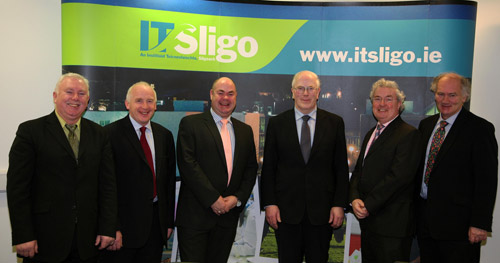A major WorldSkills Council meeting was held at IT Sligo this week, as Ireland prepares for the prestigious WorldSkills Lodon 2011 championships, which take place in October. The highly regarded biennial event is the world’s largest, international skills competition where young people from across the globe compete to get international recognition in their chosen skill.
Dozens of skills ranging from electronics to plumbing, creative arts and fashion to cabinet making are on show, giving Irish participants a worldwide audience to show off their skills against the best the world has to offer.
Over its 60-year history, WorldSkills International (formerly known as the Skill Olympics) has come to symbolise the pinnacle of excellence in vocational training.
Former Head of the Department of Engineering & Technology at IT Sligo, Michael Casserly, is an Irish Worldskills council member representing IOTI, the Institutes of Technology Ireland. He remains a driving force behind the competition.
“In October there will be 1,000 apprentices competing against each other in about 40 different skills. It puts Irish skills on the world market and displays to foreign industrialists, and to the world, that we have people with skills who are among the best. Traditionally the Irish have done very well in this competition, dating back to 1957,” he said.
“We also have an annual national event where there is keen competition to make the Irish team. It takes place in April. IT Sligo has hosted annual events over the years, but it’s now centrally based in Dublin and Cork. This year, IT Sligo will have competitors in carpentry/joinery and mechatronics at the national finals.”
Michael admits that the column inches accorded to such skills in the media may not be as extensive as that of a successful sports person, but WorldSkills plays a huge role in young apprentices’ gaining confidence both as individuals and in presenting their skill sets in a very public way.
For some it is recognition for outstanding achievement, while for others it provides the motivation and knowledge to aspire to higher standards. The competitions are particularly effective in the context of providing positive career role models for school-aged youngsters.
“In order to attract foreign direct investment we need to show the world what we can do things. We constantly need to highlight our profile as a country with our many skilled people. If we don’t do that, we won’t sell ourselves in the market place, we won’t generate employment, because in Ireland now it’s about manufacturing goods, making profits, generating employment and providing useful outlets for our young people” , he added.
Chairman of the Irish WorldSkills Council and official Irish delegate on the international committee, is Tom Corrigan, Dean of Craft Education and Training at DIT:
“We get a very positive reaction when we meet in IT Sligo. The North West has a huge knowledge base in a wide range of skills and we want to highlight this to a world audience.
“Both the national and international events are a wonderful opportunity to showcase our skills. Whether we win or not, the fact that our young people go out and perform so well both as individuals and as a team, under tremendous pressure, is something that should be applauded.
“The skills area is, to my knowledge the only area where we can, as a nation, compete internationally in the education sector. It is now more important than ever that we have the skills to deliver on an export basis and in terms of inward investment,” he said.

At a meeting of the WorldSkills Council in IT Sligo were, from left to right: John Casserly, FAS; Denis Healy, IVEA; Shane Raftery, Fáilte Ireland; Michael Casserly, IT Sligo; Liam Corcoran, DES; John Twohig, CIT.